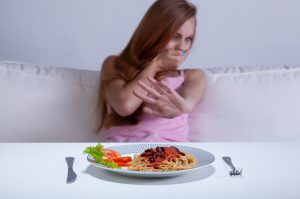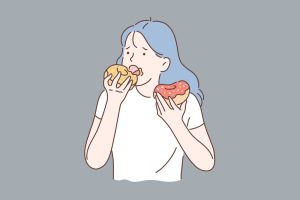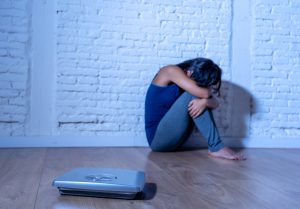Dissatisfaction with self and the primal need to eat or not eat are closely tied together. Maslow’s first need is to satisfy hunger and thirst, but while meeting these needs is necessary for existence, other abstract dissatisfactions with self can create mental disorders in fulfilling these needs. A person may deal with depression or great sadness over how he/she physically appears and proceed to great maladaptive approaches to rectify through unhealthy eating habits. Hence due to emotional mindsets, grief, depression and other views of self, one can fall into a variety of different and unhealthy eating disorders. Some may distort their eating habits to produce a certain physical look while others may distort themselves due to an addiction to food during intense grief and depression.
The Body and Eating
The necessity to eat is a need that is closely monitored by the body. When glucose drops, the body and the brain send signals. The hormone, Ghrelin secretes in the stomach to alert the brain of hunger. In addition, the Hypothalamus triggers the hormone Orexin to create the feeling of hunger. Consequentially, the body also reduces hunger through the hormone insulin which reduces sugar in the blood. The body also produces the hormone Leptin from fat cells and when in abundance relates to the brain to increase metabolism.

Beyond the physiology also is a psychology that surrounds hunger. Individuals have different taste preferences due to experiences and cultural influences, which can create certain pleasures or aversions to certain tastes. In addition when upset, the desire for carbohydrates found in comfort foods increase the neurotransmitter serotonin. When stressed, individuals crave sweets or chocolates to reduce stress. In addition, friends and the one’s environment can also produce needs to eat when one does not really need to eat, as well as serving size and proportions and numerous selections. These stimuli push one to eat things one may regret later or should not eat for health reasons. Hence peer pressure, food selection and availability, previous experiences, as well as emotional moods can all play big roles in how one eats or does not eat.
Over-eating and Obesity
Overeating can be due to depression or even bullying. Individuals may retreat to food and solace to escape the sadness of life. This is commonly associated with the term binge eating. Individuals when they feel bad, may find recourse in eating in great excess or a variety of unhealthy foods. There is usually a deep remorse following binge eating. This maladaptive way to cope with stress or depression while temporarily fulfilling causes more guilt and remorse but also physically is unhealthy. Binge eating is bad for maintaining healthy weight and can be a serious issues with those who suffer from diabetes.

Many who suffer from this need to learn better ways to cope with stress, grief and loss. It is important for those who experience higher levels of stress or facing loss to find other ways to express themselves. Better coping strategies can be implementing that are void of food security but help one find relief though healthier outlets such as exercise, hobbies, and activities with friends. Having a friend to call or a person to contact can also be beneficial in removing the psychological temptation to turn to food. Like any addiction, there is a mental crutch that manifests and a false need. Breaking the habit with healthier life styles, other options and a conscious effort is key.
Individuals can shop more healthy, limit portions, eat smaller meals throughout day, and exercise more. The important thing to remember when depressed or addicted to a maladaptive practice, one does lapse. When one does lapse, one needs to be too hard on oneself. A lapse is not a complete collapse and one needs to continue to work towards finding better ways to cope with stress and grief in life.
Anorexia nervosa and Bulimia nervosa
Some individuals deal with stress and loss differently and under eat. Some are bullied about self image through school mates, while others face sharp criticism at home about their appearances. Competition with siblings or friends can lead to a drastic alteration in one’s body and shape through unhealthy and maladaptive eating habits that reduce intake of food for thinner appearances. In Western modern culture, obviously thinner appearance is the desired result but other appearances in other cultures can also be sought after in unhealthy ways as well.

Those seeking a thinner appearance resort to Anorexic behaviors. Starvation diets are implemented due to a false image of being fat. Again due to bullying, competition, criticism, abuse, or depression, individuals will look to control the only thing they can via their appearance. It is again important to note that all cases of anorexia are not due to sexual abuse but can also be due to bullying or competitive and hyper critical families that push a unattainable perfectionism. This leaves a longing within the individual that can never be satisfied leading to maladaptive eating habits that harm the body and strip it of nutrients and growth. Primarily an issue with teens and younger women, the person will either starve oneself or in the case of Bulimia nervosa, eat and then vomit, excessively fast, or utilize laxatives to prevent weight gain. Both Anorexia and Bulimia share a common origin and look to fulfill the same end but through a different strategy.
Conclusion
Eating disorders can be hereditary and psychological. They can be an over indulgence of food or a self imposed starvation. They can stem from abuse, depression, bullying, competition, poor self image, family criticism or a disproportioned perfectionism. They are ineffective ways to cope with stress, loss and grief. Individuals who deal with these issues, regardless of their spectrum, need to find the root cause of their eating disorder and find better ways to cope with the mental issues that are haunting them. Professional licensed counselors can determine the root cause of their eating disorder and help them discover better ways to reduce eating or find self esteem in the way they are.
Whether addiction to eating too much or various mental issues to eat too little, individuals need to learn the root cause of their issues and re-discover healthier eating habits to incorporate into their life. Unhealthy eating in either extreme can have severe long term health consequences. Again, licensed counselors can help individuals better cope with stress or grief or properly understand their core issue that cause an eating disorder. Friends can also help by building up self esteem.

Obviously discontent, grief and depression can all be causes that lead to a variety of eating disorders. Licensed counselors can also become certified in Grief Counseling and help individuals sort out the grief issue and help them cope better with the loss. Please also review AIHCP’s Grief Counseling Certification and see if it meets your academic and professional goals. The program is online and independent study and open to qualified professionals seeking a four year certification in Grief Counseling.
Reference
“Exploring Psychology” 11th Edition. Myers, D. & Deall, N. (2019). Worth Publishing, NY, NY.
Additional Resources
“Eating Disorders”. (2023). Mayo Clinic. Access here
“6 Common Types of Eating Disorders (and Their Symptoms)”. Petre, A. (2022). Healthline. Access here
“What are Eating Disorders?”. (2023). APA. Access here
“Eating Disorders and Depression”. Grave, R. (2023). Psychology Today. Access here
“Can Depression Lead to Eating Disorders?” Lebow, H. (2022). PsychCentral. Access here
